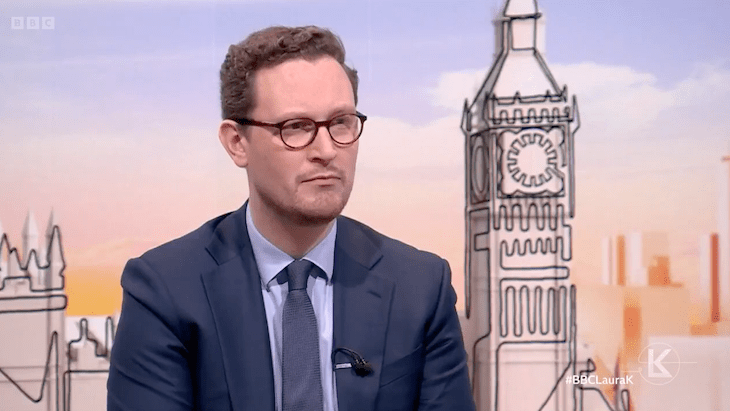A ceasefire between Israel and Hamas tentatively came into effect at 9.15 a.m. UK time, following a three-hour delay caused by Israel not receiving the names of three female hostages to be freed later today. News of the imminent ceasefire emerged as Laura Kuenssberg interviewed Chief Secretary to the Treasury Darren Jones on the BBC. Among the names of the hostages due to be released today is British-Israeli Emily Damari. Kuenssberg asked Darren Jones what reassurance he could give to British families whose loved ones were captured. Jones said it would be an ‘increase in hope’ for the family of Emily Damari that her name was listed, but that families would ‘only be able to breathe’ when their relatives had been returned.
Adam Rose: ‘We don’t know who’s alive and who’s dead’
Laura Kuenssberg also interviewed Adam Rose who is a lawyer for the British families of Israeli hostages. Rose told Kuenssberg that his advice to every family had been that until a relative was safely home, they must assume ‘nothing is happening, and… prepare for the worst’. Rose said that Mandy Damari, mother of Emily Damari, had received no information about Emily’s well-being since she was captured, but that the Israeli authorities believe the majority of the 33 hostages due to be released are still alive. He told Kuenssberg his expectation was that Hamas would hand hostages to the Red Cross, who would then transport them to the Israelis, as happened with the last exchange in November 2023.
Darren Jones not worried about ‘residual resentment’ between the UK and Trump
Darren Jones was also asked about Trump, whose inauguration will take place tomorrow. Kuenssberg suggested there might be some ‘scar tissue’ between the US and the UK, and referenced the Mayor of London Sadiq Khan, who told the Observer he was worried about fascism and the march of the far right. Jones said he and the UK government did not agree with Khan’s sentiments. He pointed out that Trump had won a democratic election, and said the UK looked forward to working with him. Jones suggested that the UK should be ‘confident about itself’ and its capabilities, and claimed: ‘there will be plenty of opportunities for us to do deals with President Trump’. Kuenssberg then asked Jones if he was confident that Peter Mandelson would be accepted as US ambassador, with reports emerging that the Trump administration is considering rejecting him. Jones said he was confident, and argued that the UK government had picked a senior politician for the first time in 50 years because Starmer recognises the ‘important relationship’ between the two countries, and wants to ‘do things differently’.
Priti Patel: we ‘don’t know’ whether to believe Trump’s rhetoric
Laura Kuenssberg asked shadow foreign secretary Priti Patel about recent Trump speeches in which he said that he wants to take over Greenland, and would like Canada to become the 51st state. Patel said she didn’t know whether to believe him, and that we needed to ‘wait and see what his policies are’, but argued the UK would always work alongside the US when it comes to security and economic prosperity. Kuenssberg pointed out that alliances are based on ‘trust and respect’, and asked if Patel felt able to believe what Trump says. Patel repeated that we ‘don’t know what his motivation is’, but suggested that she would be prepared to ‘stand up for [the UK’s] interests’, and tell Trump he was wrong over tariffs. She said Labour should resume free trade deal talks with the US.
Darren Jones: Rachel Reeves ‘absolutely is’ an ‘iron chancellor’
Lastly, over on GB News, Camilla Tominey asked Darren Jones if Rachel Reeves’s comments that she wanted to be known as the ‘iron chancellor’ were credible. Tominey listed the woes that have beset the UK economy since Reeves announced her budget. Jones defended Reeves, telling Tominey that the Chancellor’s budget had dealt with the ‘£22 billion black hole’ that Labour inherited, and given ‘stability to public spending over the years ahead’. Jones contrasted Reeves’s performance with that of Liz Truss, claiming that international markets have increased borrowing costs for all governments, whereas the UK’s difficulties after Liz Truss announced her budget were an outlier.






Comments